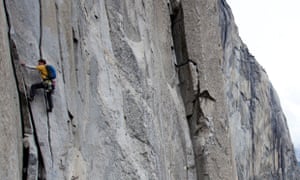Rock climbing is expected to be catapulted on to the world stage by becoming an Olympic sport.
Though an official announcement is still a few weeks off, sport insiders say it is to feature at the Tokyo Olympics.
Sport climbing was one of five sports recommended for the Olympics by organisers of the 2020 Games, along with skateboarding, surfing, baseball/softball and karate. Under new rules, host cities can pick sports for possible inclusion.
The International Federation of Sports Climbing is working out the finer details about how competitors will be scored but essentially there will be three disciplines, lead climbing, a speed test and bouldering, with the gold medal going to the competitor with the overall highest score.
Some within the sport see inclusion in the Olympics as the ultimate reward for years of hard work. But others have expressed concern that this is could be the first step to regulation, officialdom and the commercial exploitation of a sport that for many years lay beneath the radar.
Their main fear is that the pursuit of climbing rocks in the outdoors, unfettered by rules and fees, will become a thing of the past.
The sport has come a long way since being the preserve of privileged Victorian mountaineers who climbed previously unscaled alpine peaks on summer jaunts. Now it is a popular pursuit, with an increasing number of at state of the art indoor climbing centres and dedicated online TV channels.
The announcement of the sport’s inclusion in the Olympics is expected on 3 August.
Shauna Coxsey, 23, who this year became the first Briton to win the Bouldering World Cup in the event’s 17-year history, is one of those who is fully behind climbing becoming an Olympic sport.
“Anything that makes people live a healthier lifestyle is surely a good thing. This will make climbing even more popular and hopefully open it up to people who normally wouldn’t give it a go,” said the 23-year-old from Runcorn, Cheshire.
“The sport has grown rapidly over the past decade, mostly with indoor climbing walls. I know there are some people who feel that crags may become overrun but I would like to see it become more accessible to everyone.”
In bouldering, competitors must master four short and highly gymnastic climbs, unroped but above padded mats, in the shortest number of attempts in four or five minutes, ideally on the first go.
Coxsey, who trains 40 hours a week and began climbing at four, is considering whether she would compete in the Olympics.
“I want to wait and see how they work out the details and scoring first. I’m a boulderer so I would have to adapt to compete in the two other disciplines but this could be a positive thing,” she said.
Competitive climbing, of which sport climbing is one of the disciplines, secured a foothold in Europe in the early 1980s and then gained traction in the US a decade later. Now, it is gaining a following in other parts of the world.
In a competition, participants are given just a few minutes to analyse a route up a face pre-determined by organisers. Climbing one at a time, whoever gets the highest in the time allotted captures the gold medal.
Unlike traditional climbing, sport climbing relies on permanent anchors like bolts fixed to the rock.

Alex Honnold is widely considered the world’s best free climber. The 30-year-old American said he expected to spend the two weeks of the Tokyo Games doing a solo ascent somewhere on a remote part of the planet.
This was not because he did not not care for the Olympics, Honnold told Reuters in an interview last year. “The real reason I wouldn’t compete in the Olympics is just because I wouldn’t even be able to qualify. Competitive climbing is basically a whole different sub-sport.
“I’m more of an adventurer: lots of travel, lots of new routes outdoors, not so much training inside. I can’t climb at nearly the level required for competition.”
While Honnold enjoys scaling the famed El Capitan in Yosemite National Park, California, or tackling Borneo’s formidable Mount Kinabalu, he says a timed ascent of a manmade mountain does not interest him.
He added: “Last season in Patagonia we attempted a traverse of the Torres that wound up taking 53 hours to get back to camp,” he said, referring to a particularly tricky climbing site. “That kind of fitness and experience does not help at all when a competition lasts a few minutes and takes place on one extremely hard route.
“It’s like asking an ultra-marathoner if he’d like to win a 100m sprint. Sure, it sounds cool to win the Olympics, but I’ve already gone down a different path.”
But Rob Adie, competitions officer at the British Mountaineering Council, who has helped to spearhead the campaign for climbers to compete at the Olympics, said inclusion in 2020 could only be a good thing.
“Climbing is such a wide-ranging sport and there are so many different facets to it such as alpine climbing or those that like to go off to the Himalayas. This is just another aspect. It is an interesting sport and it is a good thing that it will be recognised on a world stage,” he said.



